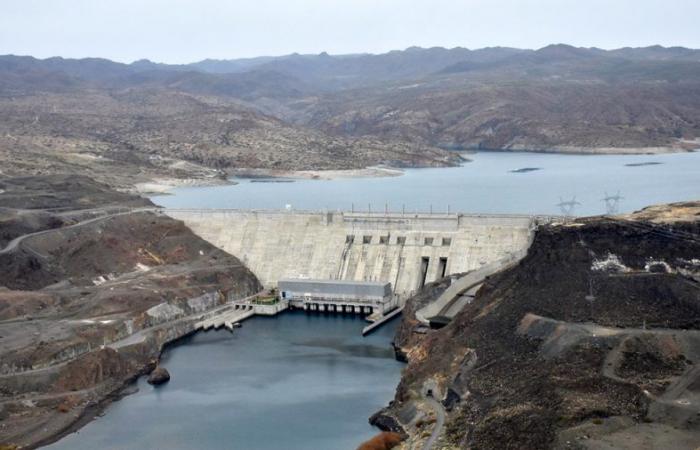The government highlighted the defense of the people of Neuquén in the face of what it considered an attack by the national administration. He will request that the collection of the fee be respected. In addition, a note was sent demanding that the pending infrastructure works on the Neuquén River be urgently carried out, given “the vulnerability currently presented by the Cerros Colorados Complex.”
After the Official Gazette of the Nation published the constitution of four public limited companies with national funds to produce and sell energy from the Limay and Neuquén rivers, Governor Rolando Figueroa recalled that the resources belong to the provinces and requested that Neuquén be convened to establish the collection of the fee for water.
Given this situation, the Minister of Infrastructure, Rubén Etcheverry, stated that “there is a lack of predictability for the provinces that were not summoned. The concession expires on August 11 and it was not communicated or anticipated what these companies were created for. This generates uncertainty for all employees, investors and the provinces.”
“We have known for 30 years that they were going to expire and we do not have a way from the National State to know what they are going to do with those concessions,” he stressed and assured that the governor “has always fought for the participation of the provinces in the administration of the dams that are on our rivers and for the opening of the dialogue table that has not yet been convened to discuss this issue.”
“People do not know if they will be out of work or not on August 11, because there is no longer any possibility of extension and there has been no communication from the Nation. There is no definition about what they are going to do, other than that they have said that they are going to privatize them,” said Etcheverry.
The measure was taken amid plans to transfer national assets and auction new operating contracts. The new joint stock companies are named after the complexes: El Chocón, Alicurá, Piedra del Águila and Cerros Colorados. They will remain in the hands of Energía Argentina SA (ENARSA) and Nucleoeléctrica Argentina.
“Surprisingly, four companies have been created with the names of the dams,” said the minister from Neuquén, and stressed that both ENARSA and Nucleoeléctrica Argentina “have no capacity, no track record, nor background to manage hydroelectric dams.” “Even if it is a short period, it is a very complex issue,” he added.
He reported that the province has been waiting since March for a dialogue table to be held and “it has not yet been convened.” “This only worsens the situation and generates more uncertainty with these four resolutions, which all they do is create four companies without saying why,” he added.
Figueroa, along with his Rio Negro counterpart Alberto Weretilneck, had been summoned to a table with national officials in which it was planned to address the situation with the dams, but it never materialized. At the end of 2023, the Neuquén deputies had presented a precautionary measure before Justice requesting “not to innovate” and that the original domain of the province of Neuquén over its natural resources be respected.
“Both Governor Figueroa and Weretilneck have worked together and agree on the need for a dialogue table where they can agree on all the ancillary and related issues that have to do with the concessions, with the position of defending the provinces and their resources,” the minister recalled. The legislatures of both provinces have already approved their respective laws for the collection of fees for the use of river water for the generation of electrical energy.
The province demanded that the Nation execute the delayed works on the Neuquén River
The government of the province of Neuquén once again complained to the Nation about the repeated flooding of the Neuquén River and demanded that the pending infrastructure works be urgently carried out “to guarantee the safety of the life, environment and property of the inhabitants.” .
He did so through a note sent by the Minister of Infrastructure to the Secretary of Energy of the Nation, Eduardo Rodríguez Chirillo.
In the note sent by the government of Rolando Figueroa, it referred to “the vulnerability that the Cerros Colorados Complex currently presents and the consequent risks to which the population and potentially affected infrastructure are exposed.”
It is worth remembering that Justice had condemned the National State to carry out the necessary works to guarantee the safety of the Portezuelo Grande dam, a member of the Cerros Colorados Complex, expanding its capacity to resist a probable maximum flood of 14,520 cubic meters per second. But to date they have not been executed.
Portezuelo Grande is the only hydroelectric project in the region that does not impound the water, but rather diverts it to Los Barreales and then, through a dam, to Mari Menuco, from where it is returned to the Neuquén River.
The Neuquén minister reported that new hydrological studies by the Interjurisdictional Authority of the Limay, Neuquén and Negro River Basins (AIC), after the floods of July 2006 and May 2008, brought the values of the maximum probable flood to 25,000 cubic millimeters per second.
In the note sent by Etcheverry, he indicated that this value “significantly exceeds the premise taken into consideration by the Court when issuing its ruling, which makes the proposed solutions defined in the judicial file scarce or insufficient.” And he adds that in the face of these values “any investment made in the Portezuelo Grande dam will not be able to fulfill the intended purpose: to provide security to the assets, the environment and people located downstream.”
In this context, he said that “the only possibility of managing the flooding is the construction of additional reservoirs in the basin (Chihuido 1 and 2).”
Finally, he emphasized that the execution of some of the works planned on the Neuquén River “will not only provide greater security by regulating floods” but will also help during periods of drought and will allow “generating clean, firm energy from a renewable source.”






